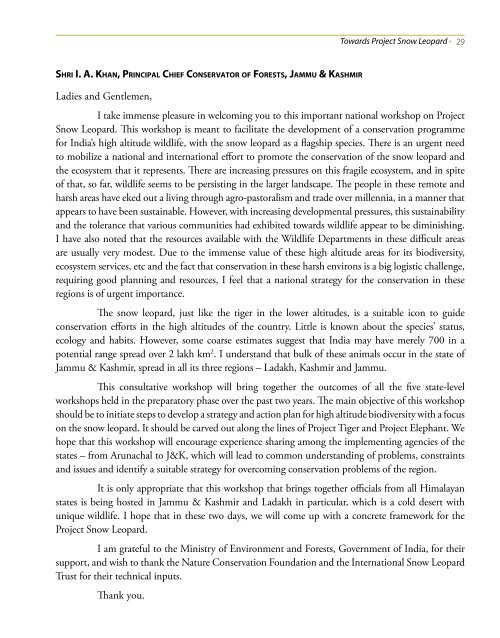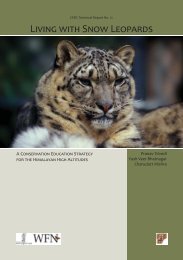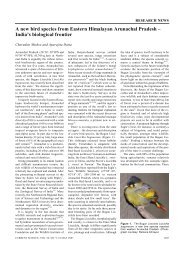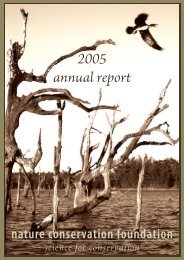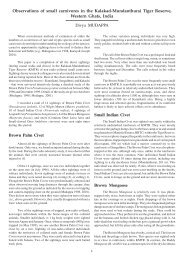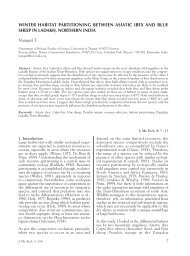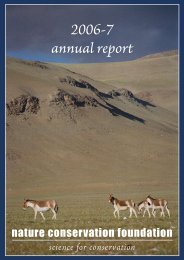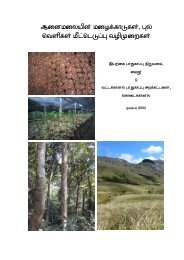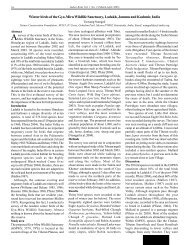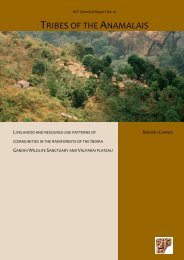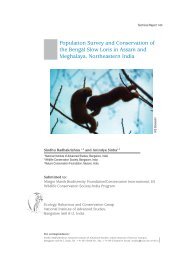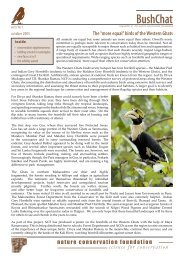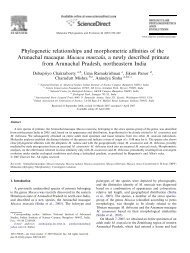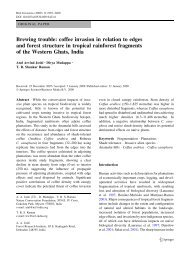towards project snow leopard - Nature Conservation Foundation
towards project snow leopard - Nature Conservation Foundation
towards project snow leopard - Nature Conservation Foundation
You also want an ePaper? Increase the reach of your titles
YUMPU automatically turns print PDFs into web optimized ePapers that Google loves.
Towards Project Snow Leopard • 29<br />
Shri I. A. Khan, Principal Chief Conservator of Forests, Jammu & Kashmir<br />
Ladies and Gentlemen,<br />
I take immense pleasure in welcoming you to this important national workshop on Project<br />
Snow Leopard. This workshop is meant to facilitate the development of a conservation programme<br />
for India’s high altitude wildlife, with the <strong>snow</strong> <strong>leopard</strong> as a flagship species. There is an urgent need<br />
to mobilize a national and international effort to promote the conservation of the <strong>snow</strong> <strong>leopard</strong> and<br />
the ecosystem that it represents. There are increasing pressures on this fragile ecosystem, and in spite<br />
of that, so far, wildlife seems to be persisting in the larger landscape. The people in these remote and<br />
harsh areas have eked out a living through agro-pastoralism and trade over millennia, in a manner that<br />
appears to have been sustainable. However, with increasing developmental pressures, this sustainability<br />
and the tolerance that various communities had exhibited <strong>towards</strong> wildlife appear to be diminishing.<br />
I have also noted that the resources available with the Wildlife Departments in these difficult areas<br />
are usually very modest. Due to the immense value of these high altitude areas for its biodiversity,<br />
ecosystem services, etc and the fact that conservation in these harsh environs is a big logistic challenge,<br />
requiring good planning and resources, I feel that a national strategy for the conservation in these<br />
regions is of urgent importance.<br />
The <strong>snow</strong> <strong>leopard</strong>, just like the tiger in the lower altitudes, is a suitable icon to guide<br />
conservation efforts in the high altitudes of the country. Little is known about the species’ status,<br />
ecology and habits. However, some coarse estimates suggest that India may have merely 700 in a<br />
potential range spread over 2 lakh km 2 . I understand that bulk of these animals occur in the state of<br />
Jammu & Kashmir, spread in all its three regions – Ladakh, Kashmir and Jammu.<br />
This consultative workshop will bring together the outcomes of all the five state-level<br />
workshops held in the preparatory phase over the past two years. The main objective of this workshop<br />
should be to initiate steps to develop a strategy and action plan for high altitude biodiversity with a focus<br />
on the <strong>snow</strong> <strong>leopard</strong>. It should be carved out along the lines of Project Tiger and Project Elephant. We<br />
hope that this workshop will encourage experience sharing among the implementing agencies of the<br />
states – from Arunachal to J&K, which will lead to common understanding of problems, constraints<br />
and issues and identify a suitable strategy for overcoming conservation problems of the region.<br />
It is only appropriate that this workshop that brings together officials from all Himalayan<br />
states is being hosted in Jammu & Kashmir and Ladakh in particular, which is a cold desert with<br />
unique wildlife. I hope that in these two days, we will come up with a concrete framework for the<br />
Project Snow Leopard.<br />
I am grateful to the Ministry of Environment and Forests, Government of India, for their<br />
support, and wish to thank the <strong>Nature</strong> <strong>Conservation</strong> <strong>Foundation</strong> and the International Snow Leopard<br />
Trust for their technical inputs.<br />
Thank you.


